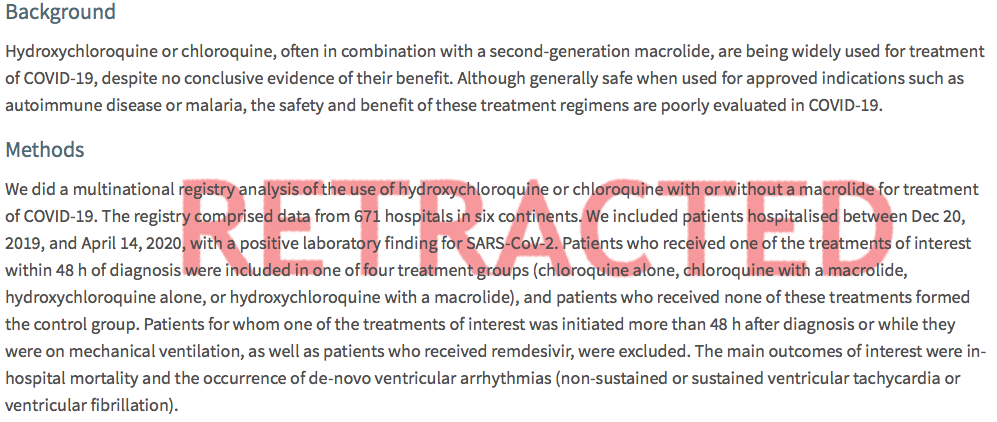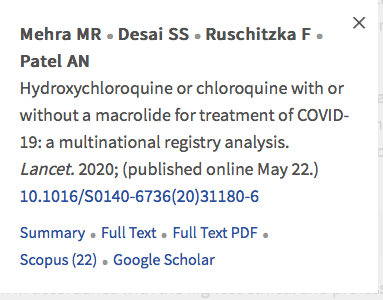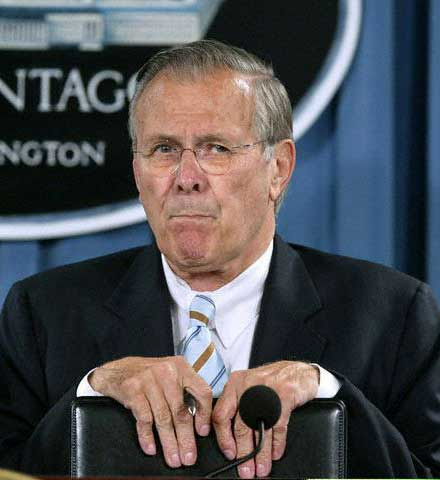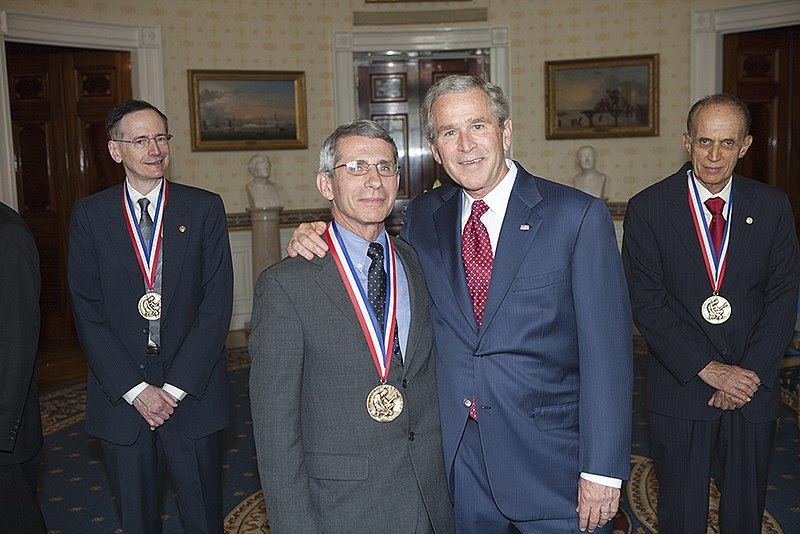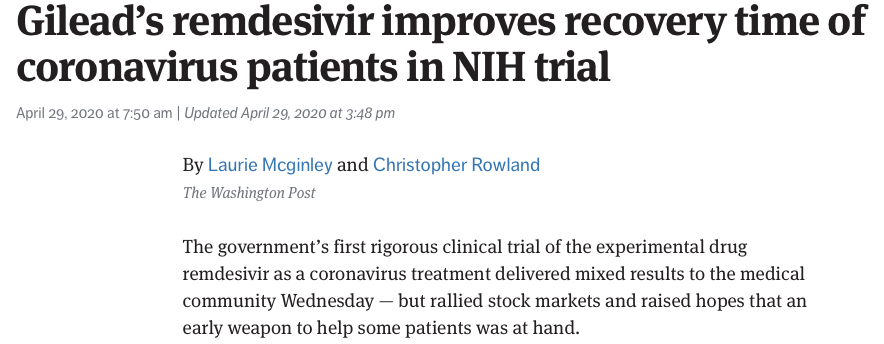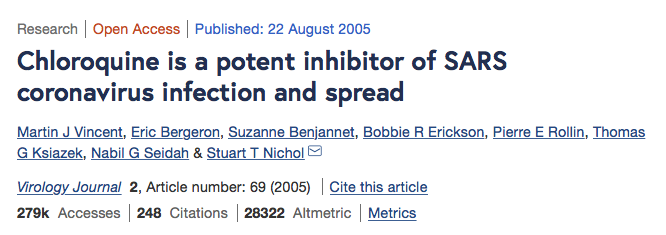Lying liars and the expensive ineffective drugs they sell when cheap ones that work are readily available.
Mon 5:10 pm +01:00, 6 Jul 2020| LancetGate: “Scientific Corona Lies” and Big Pharma Corruption. Hydroxychloroquine versus Gilead’s Remdesivir |
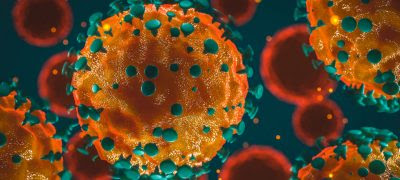 There is an ongoing battle to suppress Hydroxychloroquine (HCQ), a cheap and effective drug for the treatment of Covid-19. The campaign against HCQ is carried out through slanderous political statements, media smears, not to mention an authoritative peer reviewed “evaluation” published on May 22nd by The Lancet, which was based on fake figures and test trials. The study was allegedly based on data analysis of 96,032 patients hospitalized with COVID-19 between Dec 20, 2019, and April 14, 2020 from 671 hospitals Worldwide. The While The Lancet article was retracted, the media casually blamed “a tiny US based company” named Surgisphere whose employees included “a sci-fi writer and an adult content model” for spreading “flawed data” (Guardian). This Chicago based outfit was accused of having misled both the WHO and national governments, inciting them to ban HCQ. None of those trial tests actually took place.
When the scam was revealed, Dr. Mandeep Mehra who holds the Harvey Distinguished Chair of Medicine at Brigham and Women’s Hospital apologized:
But that “truly sorry” note was just the tip of the iceberg. Why? Studies on Gilead Science’s Remdesivir and Hydroxychloroquine (HCQ) Were Conducted Simultaneously by Brigham and Women’s Hospital (BWH) While The Lancet report (May 22, 2020) coordinated by Dr. Mandeep Mehra was intended “to kill” the legitimacy of HCQ as a cure of Covid-19, another important (related) study was being carried out (concurrently) at BWH pertaining to Remdesivir on behalf of Gilead Sciences Inc. Dr. Francisco Marty, a specialist in Infectious Disease and Associate Professor at Harvard Medical School was entrusted with coordination of the clinical trial tests of the antiviral medication Remdesivir under Brigham’s contract with Gilead Sciences Inc:
While Dr. Mandeep Mehra was not directly involved in the Gilead Remdesevir BWH study under the supervision of his colleague Dr. Francisco Marty, he nonetheless had contacts with Gilead Sciences Inc: “He participated in a conference sponsored by Gilead in early April 2020 as part of the Covid-19 debate” (France Soir, May 23, 2020) What was the intent of his (failed) study? To undermine the legitimacy of Hydroxychloroquine? According to France Soir, in a report published after The Lancet Retraction:
Was Dr. Mandeep Mehra in conflict of interest? (That is a matter for BWH and the Harvard Medical School to decide upon). Who are the Main Actors?Dr. Anthony Fauci, advisor to Donald Trump, portrayed as “America’s top infectious disease expert” has played a key role in smearing the HCQ cure which had been approved years earlier by the CDC as well as providing legitimacy to Gilead’s Remdesivir. Dr. Fauci has been the head of the National Institute of Allergy and Infectious Diseases (NIAID) since the Reagan administration. He is known to act as a mouthpiece for Big Pharma. Dr. Fauci launched Remdesivir in late June (see details below). According to Fauci, Remdesevir is the “corona wonder drug” developed by Gilead Science Inc. It’s a $1.6 billion dollar bonanza. Gilead Sciences Inc: History Gilead Sciences Inc is a Multibillion dollar bio-pharmaceutical company which is now involved in developing and marketing Remdesivir. Gilead has a long history. It has the backing of major investment conglomerates including the Vanguard Group and Capital Research & Management Co, among others. It has developed ties with the US Government.
Rumsfeld maintained his links to Gilead Sciences Inc throughout his tenure as Secretary of Defense (2001-2006). According to CNN Money (2005): “The prospect of a bird flu outbreak … was very good news for Defense Secretary Donald Rumsfeld [who still owned Gilead stocks] and other politically connected investors in Gilead Sciences”. Anthony Fauci has been in charge of the NIAID since 1984, using his position as “a go between” the US government and Big Pharma. During Rumsfeld’s tenure as Secretary of Defense, the budget allocated to bio-terrorism increased substantially, involving contracts with Big Pharma including Gilead Sciences Inc. Anthony Fauci considered that the money allocated to bio-terrorism in early 2002 would:
In 2008, Dr. Anthony Fauci was granted the Presidential Medal of Freedom by president George W. Bush “for his determined and aggressive efforts to help others live longer and healthier lives.” The 2020 Gilead Sciences Inc Remdesivir ProjectWe will be focussing on key documents (and events) Chronology April 10: The Gilead Sciences Inc study published in the NEJM on Remdesivir April 29: Release of the NIH Government Study on Remdesivir May 22, The BWH-Harvard Study on Hydroxychloroquine coordinated by Dr. Mandeep Mehra published in The Lancet June 5: The (fake) Lancet Report (May 22) on HCQ is retracted. July 29, Fauci announcement. The $1.6 Billion Remdevisir HHS Agreement with Gilead Sciences Inc April 10: A Gilead sponsored report was published in New England Journal of Medicine in an article entitled “Compassionate Use of Remdesivir for Patients with Severe Covid-19” . It was co-authored by an impressive list of 56 distinguished medical doctors and scientists, many of whom were recipients of consulting fees from Gilead Sciences Inc. Gilead Sciences Inc. funded the study which included several staff members as co-authors.
The NEJM article states that “Gilead Sciences Inc began accepting requests from clinicians for compassionate use of remdesivir on January 25, 2020”. From whom? According to the WHO (January 30, 2020) there were 82 cases in 18 countries outside China of which 5 were in the US, 5 in France and 3 in Canada. Several prominent physicians and scientists have cast doubt on the Remdesivir study conducted by Gilead, focussing on the small size of the trial. Ironically, the number of patients in the test is less that the number of co-authors: “53 patients” and “56 co-authors” Below we provide excerpts of scientific statements on the Gilead NEJM project (Science Media Centre emphasis added) published immediately following the release of the NEJM article: “‘Compassionate use’ is better described as using an unlicensed therapy to treat a patient because there are no other treatments available. Research based on this kind of use should be treated with extreme caution because there is no control group or randomisation, which are some of the hallmarks of good practice in clinical trials. Prof Duncan Richard, Clinical Therapeutics, University of Oxford “It is critical not to over-interpret this study. Most importantly, it is impossible to know the outcome for this relatively small group of patients had they not received remdesivir. Dr Stephen Griffin, Associate Professor, School of Medicine, University of Leeds, “The research is interesting but doesn’t prove anything at this point: the data are from a small and uncontrolled study. Simon Maxwell, Professor of Clinical Pharmacology and Prescribing, University of Edinburgh: “The data from this paper are almost uninterpretable. It is very surprising, perhaps even unethical, that the New England Journal of Medicine has published it. It would be more appropriate to publish the data on the website of the pharmaceutical company that has sponsored and written up the study. At least Gilead have been clear that this has not been done in the way that a high quality scientific paper would be written. Prof Stephen Evans, Professor of Pharmacoepidemiology, London School of Hygiene & Tropical Medicine “It’s very hard to draw useful conclusions from uncontrolled studies like this particularly with a new disease where we really don’t know what to expect and with wide variations in outcomes between places and over time. One really has to question the ethics of failing to do randomisation – this study really represents more than anything else, a missed opportunity.” Prof Adam Finn, Professor of Paediatrics, University of Bristol To review the complete document of Science Media Centre pertaining to expert assessments click here April 29: US Government Study. The National Institutes of Health (NIH) Study on Remdevisir On April 29th following the publication of the Gilead Sciences Inc Study in NEJM on April 10, a report of the National Institutes of Health (NIH) on Remdevisir was released. The study had been initiated on February 21, 2020. It included preliminary data analysis from a randomized trial involving 1063 hospitalized patients. The results of the trial labelled Adaptive COVID-19 Treatment Trial (ACTT) are scanty and preliminary. conducted under the helm of Dr. Fauci’s National Institute of Allergy and Infectious Diseases (NIAID).
The Washington Post applauded Anthony Fauci’s initiative:
Large, randomized?? Around the World (??) On balance, the initial scholarly response at Science Media Centre to the NIH study has been positive when compared to those pertaining to the Gilead study published in the NEJM (see above). Pertains to “preliminary results”. May 22: The Fake Lancet Report on HCQ The Fake Lancet Report on HCQ was published on May 22, 2020. Immediately, the media went into high gear, smearing the HCQ cure, while applauding Gilead’s Remdesivir (April 10 in the NEJM) and the April 29 HIH Report:
When the Lancet HCQ article by Bingham-Harvard was retracted on June 5, it was too late, it received minimal media coverage. Despite the Retraction, the HCQ cure “had been killed”. June 29: Fauci Greenlight. The $1.6 Billion Remdesivir Contract with Gilead Sciences Inc
Dr. Anthony Fauci granted the “Greenlight” to Gilead Sciences Inc. on June 29, 2020. The Department of Health and Human Services (HHS) announced an agreement to secure large supplies of the remdesivir drug from Gilead Sciences Inc. for the treatment of Covid-19 in America’s private hospitals and clinics. Who will be able to afford Remdisivir? 500,000 doses of Remdesivir are envisaged at $3,120 per patient, namely $1.6 billion The Drug was also approved for marketing in the European Union. under the brandname Veklury. If this contract is implemented as planned, it represents for Gilead Science Inc. and the recipient US private hospitals and clinics a colossal amount of money.
According to The Trump Administration’s HHS Secretary Alex Azar (June 29, 2020):
Remdesivir versus Hydroxychloroquine (HCQ)Carefully timing: The Remdesivir study (50+ authors) in the New England Journal of Medicine (April 10, 2020) was followed by the fake Lancet HCQ report led by Bigham-Harvard Dr. Mehra (May 22, 2020). The unspoken truth was that the Lancet study (published on May 22) was intended to undermine the legitimacy of Hydroxychloroquine as an effective cure to Covid-19, with a view to sustaining Dr. Fauci’s launch of the $1.6 billion Remdesivir drug by Gilead Sciences Inc. on June 29th. What Fauci fails to acknowledge is that Chloroquine had been “studied” and tested fifteen years ago by the CDC as a drug to be used against coronavirus infections. And that Hydroxychloroquine has been used recently in the treatment of Covid-19 in several countries. According to the Virology Journal (2005) “Chloroquine is a potent inhibitor of SARS coronavirus infection and spread”. It was used in the SARS-1 outbreak in 2002. It had the endorsement of the CDC. HCQ is not only effective, it is “inexpensive” when compared to Remdesivir, at an estimated “$3120 for a US Patient with private insurance”. Below are excerpts of an interview of Harvard’s Professor Mehra (who undertook the May 22 Lancet study) with France Soir published immediately following the publication of the Lancet report (prior to its Retraction). Dr. Mandeep Mehra: In our study, it is fairly obvious that the lack of benefit and the risk of toxicity observed for hydroxychloroquine are fairly reliable. [referring to the May 22 Lancet study] France Soir: Do you have the data for Remdesivir? MM: Yes, we have the data, but the number of patients is too small for us to be able to conclude in one way or another. FS: As you know, in France, there is a pros and cons battle over hydroxychloroquine which has turned into a public health issue even involving the financial lobbying of pharmaceutical companies. Why not measure the effect of one against the other to put an end to all speculation? … MM: In fact, there is no rational basis for testing Remdesivir versus hydroxychloroquine. On the one hand, Remdesivir has shown that there is no risk of mortality and that there is a reduction in recovery time. On the other hand, for hydroxychloroquine it is the opposite: it has never been shown any advantage and most studies are small or inconclusive In addition, our study shows that there are harmful effects. It would therefore be difficult and probably unethical to compare a drug with demonstrated harmfulness to a drug with at least a glimmer of hope. FS: You said that there is no basis for testing or comparing Remdesivir with hydroxychloroquine, do you think you have done everything to conclude that hydroxychloroquine is dangerous? MM: Exactly. … All we are saying is that once you have been infected (5 to 7 days after) to the point of having to be hospitalized with a severe viral load, the use of hydroxychloroquine and its derivative is not effective. The damage from the virus is already there and the situation is beyond repair. With this treatment [HCQ] it can generate more complications FS Mandeep Mehra declared that he had no conflict of interest with the laboratories and that this study was financed from the endowment funds of the professor’s chair. He participated in a conference sponsored by Gilead in early April 2020 as part of the Covid-19 debate. By Prof Michel Chossudovsky |

